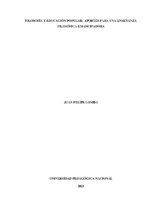Filosofía y educación popular : aportes para una enseñanza filosófica emancipadora.
Citación
Fecha
2023Autor
Lombo Albarracín, Juan Felipe
Director / Asesor / Tutor
Ramírez Orjuela, Luis Alejandro
Metadatos
Mostrar el registro completo del ítemResumen
En el siguiente trabajo de investigación se propone a la Pedagogía del concepto de Silvio Gallo como la metodología de enseñanza de la filosofía que permite materializar el aporte de esta disciplina a la Educación popular. Se comienza, en este sentido, por la delimitación provisional del significante de Educación popular, por cuanto término que recoge una pluralidad de experiencias y, asimismo, una historia diversa y contextual que impide cerrar definitivamente su significado en unos elementos esenciales. A partir de la hibridación entre las reflexiones de Simón Rodríguez y Jacques Rancière se realiza, entonces, la delimitación provisional y siempre sujeta a debate y actualización del significante, que, junto a los insumos proveídos por el debate entre Kant y Hegel alrededor de la enseñanza de la filosofía, establecen las condiciones para una enseñanza filosófica emancipadora: 1. Enseñanza filosófica, es decir, articulación entre enseñar filosofía y enseñar a filosofar, y 2. Enseñanza emancipadora, esto es, una que permita la verificación del principio de la enseñanza universal: todas las inteligencias son iguales. Se argumentará, en suma, que la Pedagogía del concepto de Gallo permite una enseñanza filosófica emancipadora, porque articula la enseñanza de la filosofía con el enseñar a filosofar y lo hace emancipando, no embruteciendo, de manera que materializa el aporte de esta disciplina a la Educación popular.
Abstract
In the following research work, the Pedagogy of Silvio Gallo's concept is proposed as the teaching methodology of philosophy that allows materializing the contribution of this discipline to Popular education. It begins, in this sense, with the provisional delimitation of the signifier of Popular education, as a term that gathers a plurality of experiences and, likewise, a diverse and contextual history that prevents to close definitively its meaning in some essential elements. From the hybridization between the reflections of Simón Rodríguez and Jacques Rancière, then, a provisional delimitation is made, always subject to debate and updating of the signifier, which, together with the inputs provided by the debate between Kant and Hegel around the teaching of philosophy, establishes the conditions for an emancipating philosophical teaching: 1. Philosophical teaching, that is to say, articulation between teaching philosophy and teaching to philosophize, and 2. Emancipatory teaching, that is, one that allows the verification of the principle of universal teaching: all intelligences are equal. It will be argued, in sum, that Gallo's Pedagogy of the concept allows an emancipatory philosophical teaching, because it articulates the teaching of philosophy with the teaching of philosophizing and does it emancipating, not brutalizing, in a way that materializes the contribution of this discipline to Popular education.
Editorial
Universidad Pedagógica Nacional
Programa académico
Especialización en Pedagogía

